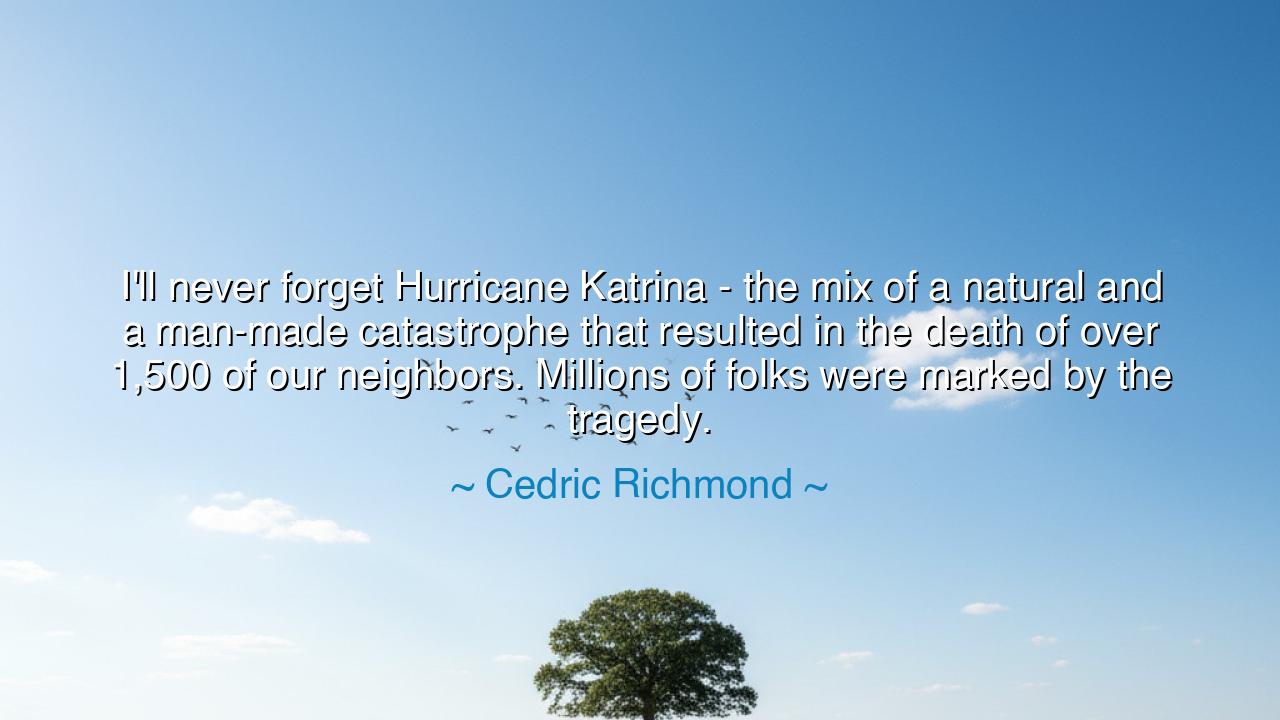
I'll never forget Hurricane Katrina - the mix of a natural and a
I'll never forget Hurricane Katrina - the mix of a natural and a man-made catastrophe that resulted in the death of over 1,500 of our neighbors. Millions of folks were marked by the tragedy.






“I'll never forget Hurricane Katrina — the mix of a natural and a man-made catastrophe that resulted in the death of over 1,500 of our neighbors. Millions of folks were marked by the tragedy.” Thus spoke Cedric Richmond, a son of New Orleans and servant of its people, bearing witness to one of the darkest hours in the history of the American South. In these words, he summons the memory of not only wind and water but also of neglect and failure—for Katrina was no ordinary storm. It was a test of nature’s power and humanity’s conscience, a storm of both the skies and the soul. Richmond’s words ring not merely as remembrance, but as warning: that when nature strikes, human frailty can deepen the wound.
The origin of this quote rests in the aftermath of Hurricane Katrina, which struck in August 2005, devastating the Gulf Coast and especially the city of New Orleans. The hurricane’s winds tore through levees, releasing walls of water that swallowed entire neighborhoods, most infamously the Lower Ninth Ward, where families—poor, proud, and often forgotten—were left stranded on rooftops and in floodwaters. But Richmond’s wisdom lies in naming it not only a “natural” disaster, but also a “man-made” one. For the storm exposed more than physical vulnerability—it revealed the deep fractures in society: poverty, inequality, and neglect. The earth may have sent the rain, but it was human failure that let the waters rise so high.
When Richmond says, “Millions of folks were marked by the tragedy,” he speaks not only of those who died but of those who lived on, forever changed. For trauma does not end when the flood recedes. It lingers in the eyes of those who lost their homes, in the silence of those who lost their kin. The city that once danced with the music of jazz now echoed with the cries of the displaced. Some never returned; others rebuilt, scarred but unbroken. The mark of such a tragedy is not visible in stone or steel—it is carried in the soul of the people, and in the lessons passed down to future generations.
Consider, O listener, the image of an elderly woman, standing upon her rooftop, clutching her Bible as the waters rose around her. For three days she waited, without food or medicine, until a boat came to rescue her. She lived, but her home—her memories, her community—were gone. What failed her was not merely the storm, but the slow hand of aid, the silence of preparation, the failure of leadership. It was a catastrophe of two kinds: the fury of the heavens and the apathy of men. And thus, Richmond’s words remind us that nature may strike, but human negligence turns storms into tragedies.
Yet amid the ruin, there was also light. Strangers became rescuers, neighbors became family, and courage bloomed like wildflowers among the ruins. The spirit of New Orleans—its rhythm, its resilience, its boundless creativity—refused to die. Musicians returned to their streets; cooks reopened their kitchens; children once more played beneath the shadow of the levees. This rebirth is what Richmond honors when he says he will “never forget.” Memory, in his words, is not merely sorrow—it is duty. To remember is to refuse repetition. To honor the dead is to guard the living.
In these words lies a truth as ancient as the flood myths of old: that disaster reveals the character of a people. When the waters rise, the masks of society fall. We see clearly who we are, what we value, and whom we abandon. Katrina was a mirror held to a nation’s face—and what it reflected was uncomfortable, but necessary to see. Richmond’s lament, then, is also a call to responsibility: to build stronger, to care deeper, to ensure that the next storm does not find us unprepared or unfeeling.
So, my friends, let this remembrance be your guide. Do not wait for the flood to awaken compassion. Do not build walls of indifference higher than the levees. Let empathy be your preparation, and community your shield. For as Richmond teaches, tragedy is not only what nature brings, but what humanity allows. The storm may come without warning, but the response—swift or slow, selfless or selfish—lies in our hands.
And thus, remember always the lesson of Hurricane Katrina: that the measure of a people is not in their power to control the winds, but in their will to lift one another from the waters. The past cannot be undone, but its memory can be transformed into strength. Let us, then, live as guardians of each other’s safety and dignity—so that when the next tempest comes, we will not again be marked by tragedy, but by compassion, courage, and unity.






AAdministratorAdministrator
Welcome, honored guests. Please leave a comment, we will respond soon